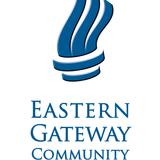- West Virginia Northern Community College's mission is to provide postsecondary educational opportunity for all citizens in the Northern Panhandle's six counties, to develop a competent district workforce which can compete in a global economy, and to respond to cultural and civic interests and needs of the communities it serves.
School Highlights
West Virginia Northern Community College serves 1,824 students (36% of students are full-time).
The college's student:teacher ratio of 12:1 is lower than the state community college average of 18:1.
Minority enrollment is 14% of the student body (majority Black and Hispanic), which is less than the state average of 25%.
Quick Stats (2025)
- Enrollment: 1,824 students
- In-state tuition: $3,154
- Out-state tuition: $9,250
- Student:teacher ratio: 12:1
- Minority enrollment: 14%
- Source: Verified school update
Top Rankings
West Virginia Northern Community College ranks among the top 20% of public schools in West Virginia for:
Category
Attribute
School Resources
Community Size
School Overview
The teacher population of 151 teachers has stayed relatively flat over five years.
West Virginia Northern Community College
(WV) Community College Avg.
Carnegie Classification
Associate's Colleges: High Career & Technical-Mixed Traditional/Nontraditional
Baccalaureate/Associate's Colleges: Mixed Baccalaureate/Associate's
Institution Level
At least 2 but less than 4 years
At least 2 but less than 4 years
Institution Control
Public
Public
Total Faculty
151 staff
49 staff
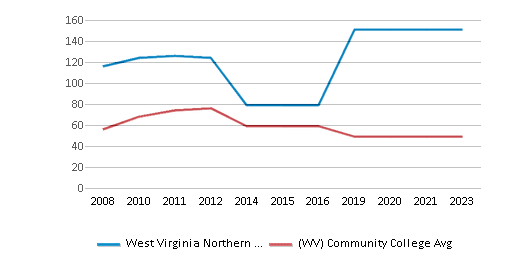
School Calendar
Student Body
The student population of West Virginia Northern Community College has grown by 34% over five years.
The student:teacher ratio of 12:1 has increased from 8:1 over five years.
The West Virginia Northern Community College diversity score of 0.26 is less than the state average of 0.42. The school's diversity has grown by 70% over five years.
Total Enrollment
1,824 students
433 students
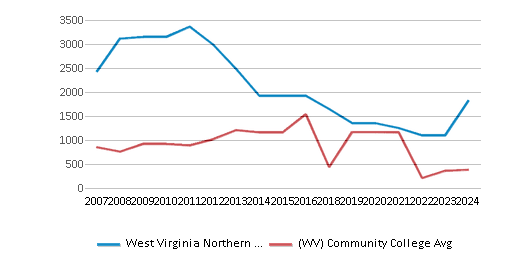
Student : Teacher Ratio
12:1
18:1
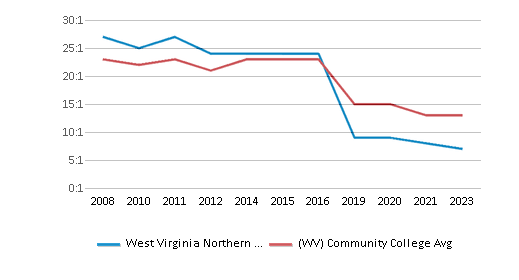
# Full-Time Students
654 students
384 students
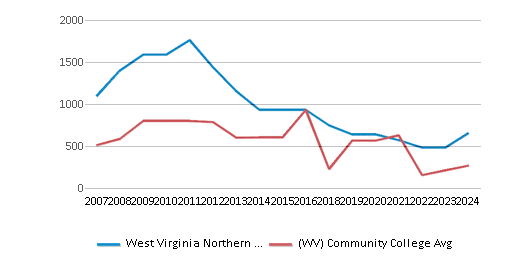
# Part-Time Students
1,170 students
476 students
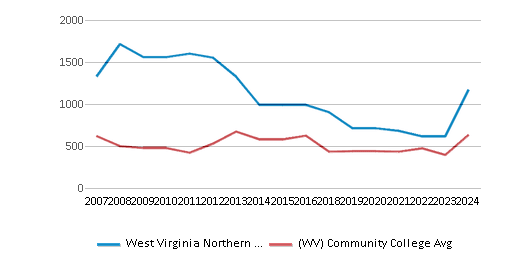
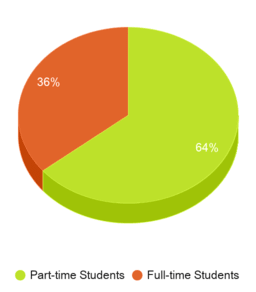
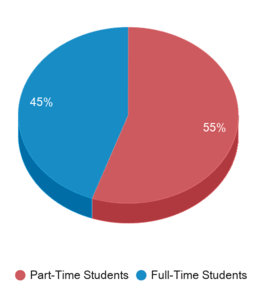
# Enrollment Undergraduate
182 students
220 students
# Full-Time Undergraduate Students
654 students
384 students
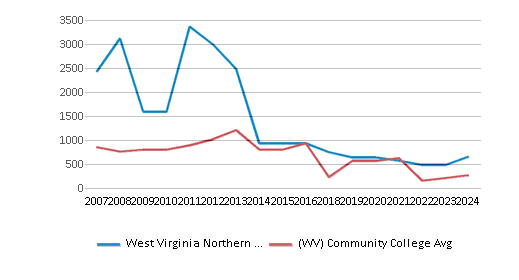
# Full-Time Graduate Students
n/a
13 students
# Part-Time Undergraduate Students
1,170 students
580 students
# Part-Time Graduate Students
n/a
11 students
Total Dormitory Capacity
n/a
100 students
% American Indian/Alaskan
n/a
n/a
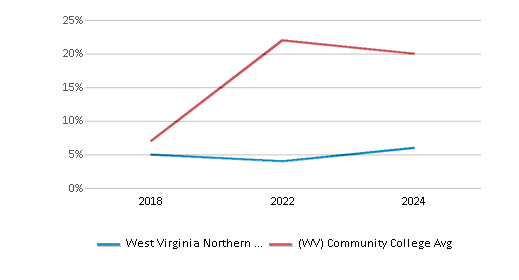
% Asian
1%
1%
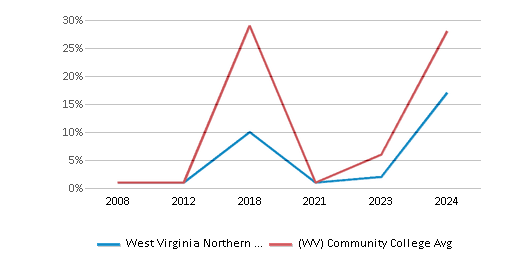
% Hispanic
2%
4%
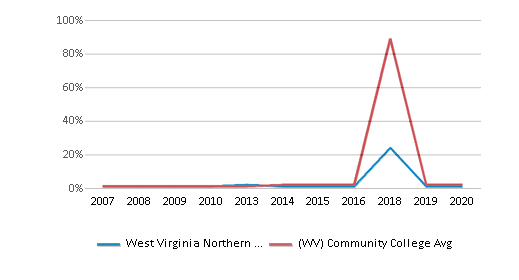
% Black
2%
8%
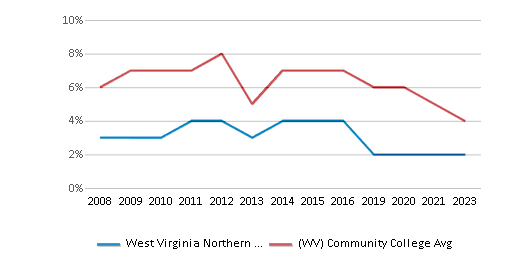
% White
86%
75%
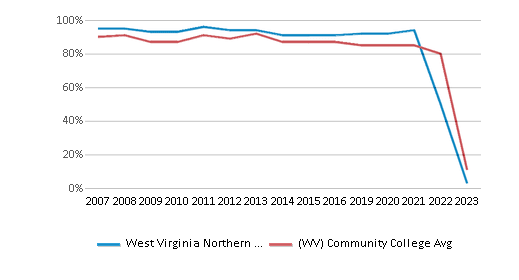
% Hawaiian
5%
4%
% Two or more races
3%
3%
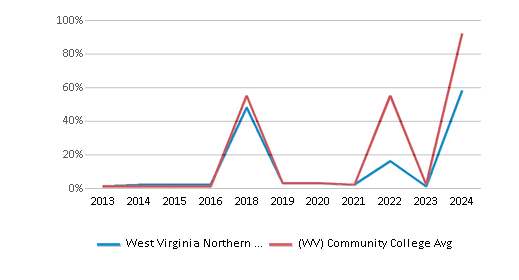
% Non Resident races
n/a
n/a
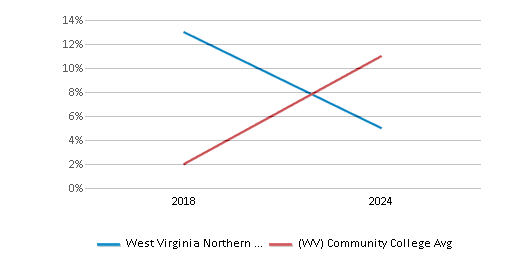
% Unknown races
1%
5%
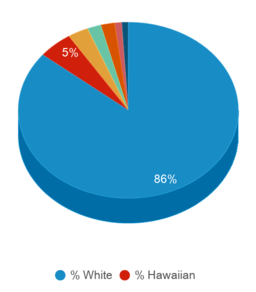
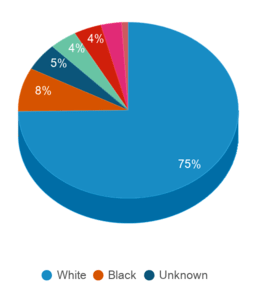
Diversity Score
0.26
0.42
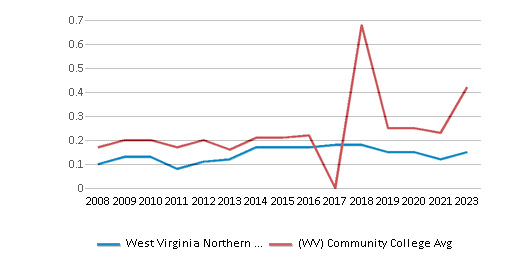
College Completion Rate (Students who graduate in less than 4 years)
0.3105%
0.5357%
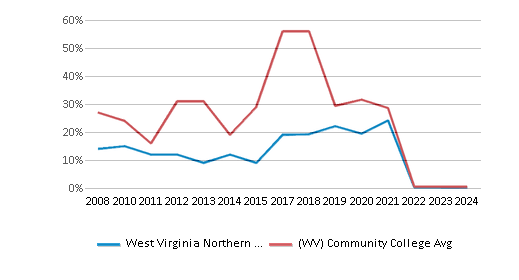
College Completion Rate (Students who graduate in 4 years or more than 4 years)
n/a
0.3003%
Average Graduate Earnings (10 Years)
$28,100
$25,000
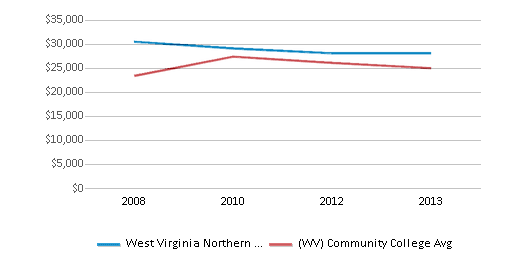
Tuition and Acceptance Rate
The public in-state tuition of $3,154 is less than the state average of $3,640. The in-state tuition has declined by 26% over four years.
The public out-state tuition of $9,250 is more than the state average of $8,321. The out-state tuition has declined by 22% over four years.
In-State Tuition Fees
$3,154
$3,640
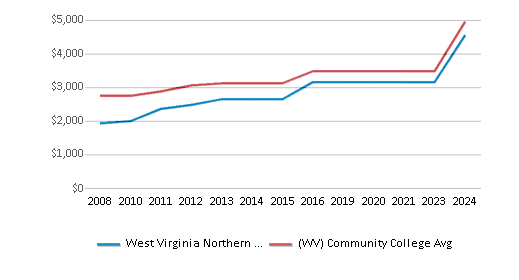
Out-State Tuition Fees
$9,250
$8,321
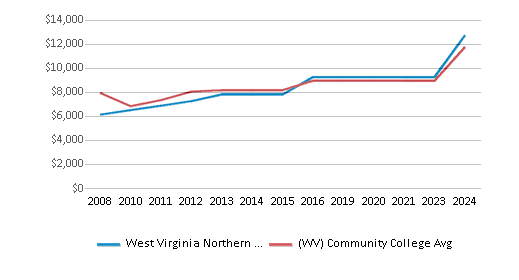
% Students Receiving Some Financial Aid
100%
90%
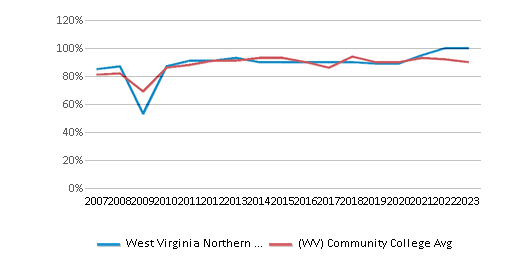
Median Debt for Graduates
$9,636
$9,500
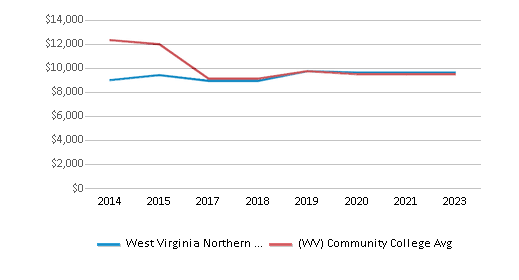
Median Debt for Dropouts
$4,365
$4,580
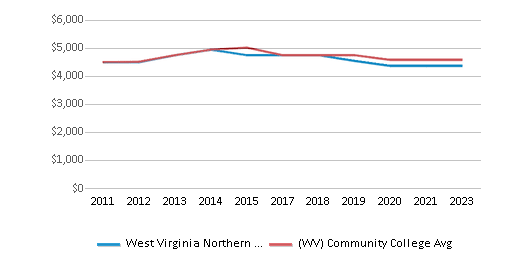
Acceptance Rate
n/a
97%
SAT Reading
n/a
450
SAT Math
n/a
460
ACT Composite
n/a
19
ACT English
n/a
19
ACT Math
n/a
18
Source: 2024 (or latest year available) Integrated Postsecondary Education Data System (IPEDS)
School Notes
- West Virginia Northern Community College is a public, multi-campus comprehensive community college which serves the six counties of Ohio, Brooke, Hancock, Marshall, Wetzel and Tyler. On May 9, 1972, the West Virginia Board of Regents created a dual-campus community college out of what were formerly the Hancock County Branch and the Wheeling Campus of West Liberty State College. The Board specified that the newly created institution was to be a comprehensive community college responsible for educational programs of two years or less duration for high school graduates and adults. Responding to local community requests, the College began offering courses in New Martinsville in 1973 and established a campus there in 1975. As a comprehensive community college, Northern offers a wide variety of programs and courses in the arts and sciences, career-technical education, developmental studies and community service. Under an open-door enrollment policy, the College admits all adults desiring postsecondary education. High school students recommended by their schools for early entrance are also admitted. Graduates receive Associate in Arts degrees, Associate in Science degrees, Associate in Applied Science degrees and Certificates. West Virginia Northern Community College has two primary locations in Wheeling. The B&O Building, located at 1704 Market Street at the southern end of the business district, received its name from its original use as the main terminal of the Baltimore and Ohio Railroad in the Ohio Valley. It contains the administrative offices of the College, counseling and student services, the College Bookstore, Business Office, Learning Resources Center, Children's Activity Center, classrooms, laboratories, faculty offices and student and faculty/staff lounges. The Hazel-Atlas Building, at Fifteenth and Jacob streets, was the original location of the College. The building continues to be used for classroom and laboratory instruction and houses the College Computer Center, Culinary Arts dining room, faculty offices, student and faculty/staff lounges. West Virginia Northern Community College is accredited by the North Central Association of Colleges and Schools.
Frequently Asked Questions
How much does West Virginia Northern Community College cost?
West Virginia Northern Community College's tuition is approximately $3,154 for In-State students and $9,250 for Out-State students.
What is West Virginia Northern Community College's ranking?
West Virginia Northern Community College ranks among the top 20% of community college in West Virginia for: Percent of students receiving financial aid and Largest student body.
Recent Articles

Obtaining Your Bachelor's Degree at a Community College
Explore the evolving landscape of community colleges offering bachelor's degrees, addressing affordability, accessibility, and workforce needs.

A to Z of Community College Certificates and Courses
From business and healthcare to technology and skilled trades, the article showcases the breadth of options available to students seeking to enhance their knowledge, develop new skills, or pursue career advancement.

What is a Community College?
This comprehensive guide explains what a community college is, its history, and its role in higher education. It covers the types of programs offered, differences from four-year colleges, benefits of attending, and important considerations for prospective students, providing valuable insights for those exploring educational options.


